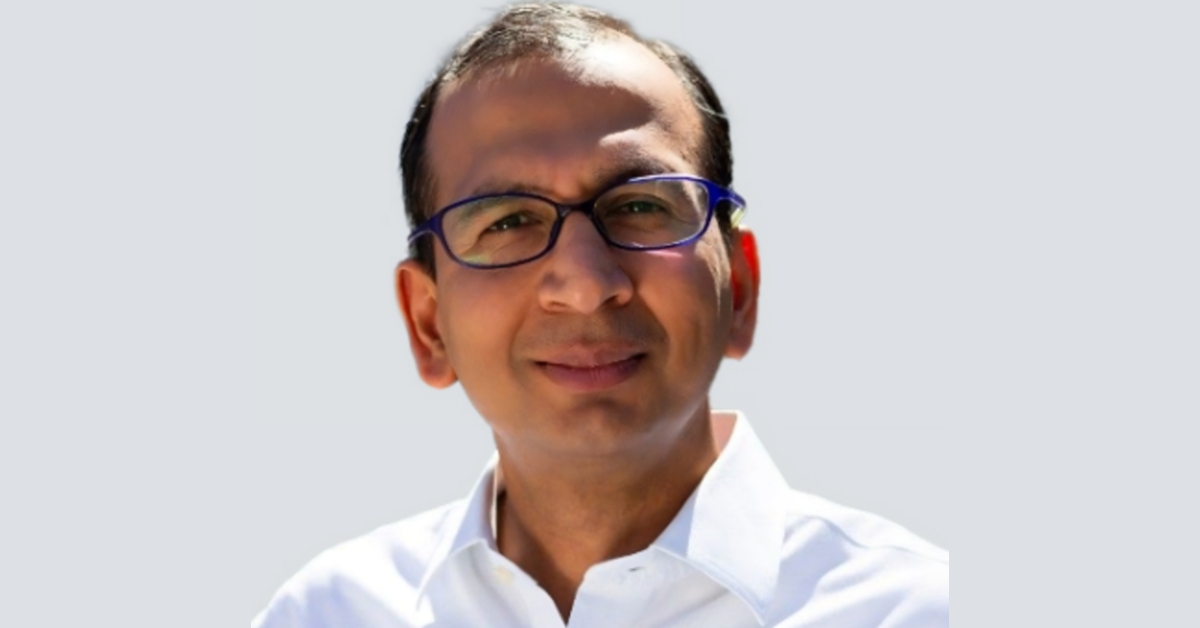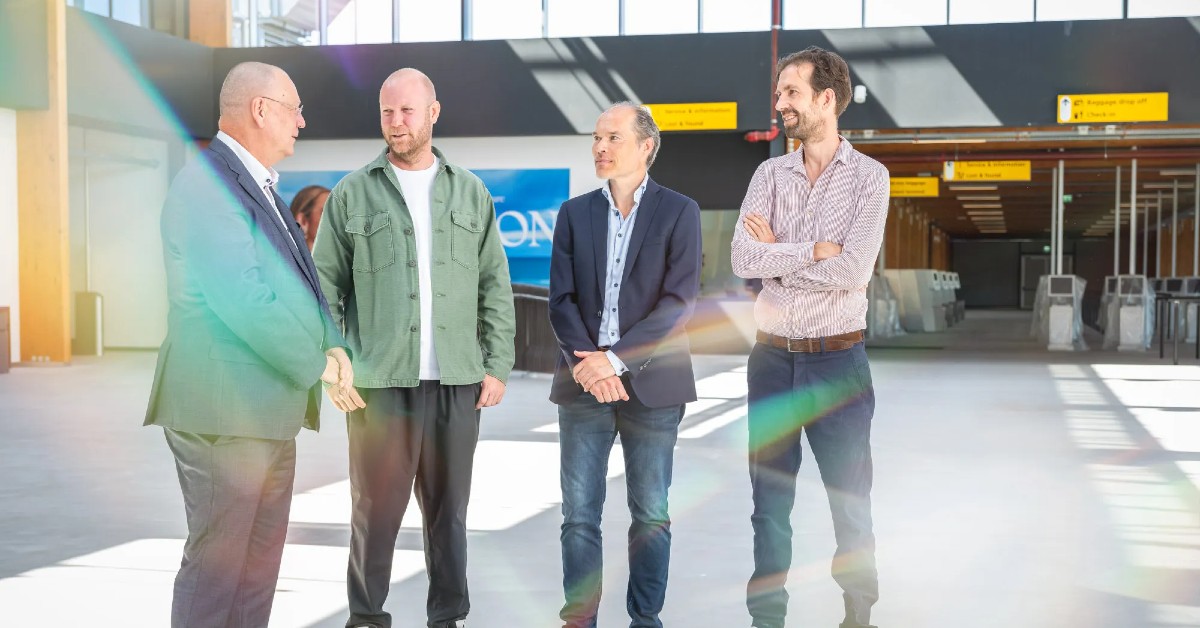When you click that ‘buy’ button in the webshop, a complex, global system is set in motion. One that turns natural resources into a product on your doorstep. But also one that depletes the earth, leaves mountains of waste and showed vulnerabilities during the pandemic. That’s why Blue Tulip Awards Consumption & Production theme is looking for innovation that allows us to produce and consume, without the negative impact on our planet.
Blue Tulip Awards hunting for innovation
Delving into the wide range of innovations is a team of experts, gathered for the Blue Tulip Awards. We spoke with three of them: Martijn Lopes Cardozo is CEO of Circle Economy and partner of the Awards; Adriaan Lieftinck and Edward Sibeijn are founders of MEZT, which won the Blue Tulip Award last year; Tatiana Glad is Company Lead of Impact Hub Amsterdam and jury lead of the Consumption & Production theme.
Circle Economy: aiming for system changes
“More than 91% of what we take from the earth is wasted.” That is the first thing you see as you visit the website of Circle Economy, a not-for-profit organisation aiming to accelerate the transition to the circular economy. 91 Per cent is a lot. “It’s also a finite model”, says Circle Economy CEO Martijn Lopes Cardozo. “We take upwards of a hundred billion tonnes of resources out of the earth every year, and most of it turns into waste. In nature, everything is used. We need to arrange our economy in the same way.”
Easier said than done, knows Lopes Cardozo. Most products we use are simply not made to be reused. “Focussing on recycling current products only allows for incremental changes and small victories. The real opportunities are when the entire system changes.” That is why ten years ago, Circle Economy was founded.
During those ten years, Lopes Cardozo has noticed that the circular economy is getting more and more traction. “People know what it is now, but they wonder how to achieve it. We are shifting from the ‘why’ to the ‘how. The circular economy is considered a large part of the solution to climate change, and consumption will play a large role.”
MEZT: vital innovation for farmers
According to Lopes Cardozo, circular production comes in many shapes and sizes. That’s also what Adriaan Lieftinck and Edward Sibeijn found out. Their company, MEZT, won the Blue Tulip Award last year. Their innovation is a machine that extracts nitrogen (ammonia), potassium and phosphate from manure produced by cattle.
These minerals allow them to turn harmful waste into fertilizer, tailor made for any crop on any soil in any season. Their invention could prove vital in a country that’s currently looking at the livestock industry to vastly reduce its nitrogen emissions.
Circular production is key
The original plan from MEZT was to go even further and also use released ammonia to generate energy and power the machine itself. The University of Wageningen, with which Lieftink and Sibeijn closely cooperate, steered them away from that idea. “To achieve circular production, it is more beneficial for us to focus on the minerals we can extract and reuse”, explains Sibeijn.
“The fertilizer industry is responsible for 5 per cent of the global energy usage and CO2 footprint. They are digging up phosphate in Morocco to fertilise crops here. By repurposing waste into fertiliser right here on the farms, we can already establish a massive reduction in CO2 emissions.” Lieftinck adds: “Besides, these farms are already producing massive amounts of energy, for instance with solar panels.”
‘Breakthrough technology to solve the crisis’
After winning the Blue Tulip Awards in march, MEZT is still largely on track to reach its goals for this year. Their first prototype is currently running in a test setup. There is a long list of 50 farmers that have indicated interest, and they’ve got their first real customer lined up, made possible by a subsidy to stimulate more sustainable farming and battle the nitrogen crisis. Sibeijn: “A lot of money is made available for farmers to use unproven technology. We want to use that to show we have the breakthrough technology to solve the crisis.”
“That is the push we need to implement our solution”, says Lieftinck. “The nitrogen crisis returned to the top of the political agenda, since nothing is solved yet. It stalled many large projects, and they are discussing spending €17 billion to buy out the biggest emitters among farmers. We think we can reduce the nitrogen emissions of those farmers to an acceptable level for maybe 10 or 20 per cent of that money. That means farmers can continue to operate, while emissions fall to within acceptable levels. Policymakers aren’t realising that yet.”
Impact Hub: start and scale sustainably
In other words: everything in the area of production and consumption is tied together. That is also something Tatiana Glad realised years back. Glad is a jury member of the Blue Tulip Awards and Company Lead of Impact Hub Amsterdam. The organisation aims to accelerate the move to the sustainable economy by helping startups start, grow and scale up their business. To do so, Impact Hub Amsterdam connects pioneers, leaders and innovators to organisations, investors, and the public sector.
Glad grew up in Canada but moved to the Netherlands years ago. After arriving she noticed the government took care of everything in the small country. “Every time I saw a problem arise here, the government solved it. It made me wonder what happens if there’s a crisis they can’t solve?”
The importance of citizen innovation
“When you go through a crisis, you can’t shift the burden to someone else. This is where citizen innovation blooms”, Glad says. And with a crisis, she obviously means the current pandemic, which has led to many new initiatives popping up. “Citizens are so creative. What COVID has brought out is a lot of people helping each other, be it through new apps or non-technological solutions. From sharing clothes to exchanging tools, this cooperation is often underestimated. Citizen entrepreneurship is the fabric for society.”
Even though Glad hoped we wouldn’t need a crisis to highlight these attributes, she’s amazed by the resilience shown and the changes made from the bottom up. The same dynamic is used by Impact Hub to focus on the themes they cover: circular ecosystems, food, inclusion and fashion. “These themes emerged out of our community, they grow bottom-up.”
How to build resilience in businesses
The resilience Glad witnessed at companies for the past one and a half years amplified the need for two things, she says. “The first one is human resources. How agile are you as an organisation? Have you invested in leadership development, experimentation and in the next generation? That is a really important part of resilience.
For the second, we need to have a hard look at the supply chains and build that same attitude there. Companies have the option to help suppliers move along and change their capacity to innovate. A supply chain works both ways, not just from raw materials to clients, but the other way around as well.”
Supply chain troubles: ‘balance isn’t restored yet’
Lopes Cardozo also sees the pandemic as proof there are two main things wrong with the current supply chain. The first one concerns circular production. “The current economy is built on using resources and then throwing them away. There are massive risks built into that model, which translate to the valuation of companies involved. Progressive companies fare better.”
“Second one is the resilience of the supply chain. Everything worked ‘just in time’, it worked until it suddenly didn’t. The balance hasn’t been restored yet, which makes people reconsider the entire system. I mean, there’s a lot of weird things happening. Food grown in Spain, shipped to China for packaging before ending up in Dutch stores? It really made everyone think about how to do better.”
Blue Tulip Awards builds networks
“The cool thing about working on a startup is that you can choose your own terrain. You can pick the supply chain where the chances are.” Lopes Cardozo knows as he did so himself as CEO of Black Bear Carbon, a startup that upcycles rubber from used tires. “These tires were already gathered somewhere, the infrastructure was already in place. We added a piece of technology and had a good business model.”
It even got him in the Blue Tulip Awards a few years back, before returning as a partner with Circle Economy for this years’ edition. “It was very useful to get to know the right people. They have a large selection of experts, and it’s a great way of building your network.”
Judges looking for commitment and tenacity
As a member of the jury, Glad knows what she will be looking for. “Commitment”, she says. “I want these innovators to really believe in their ideas. They need to be working on something they’d do anyway, regardless of the awards they can win. There needs to be this personal tenacity.”
Another important thing is whether or not the founders are looking at the big picture. “You might tackle one important issue, but are you also looking at other issues? If you’re working on a sustainable solution, does your business also cover inclusivity? And last but not least, is it viable? Have you talked to beneficiaries and can the product create traction?”
The real prize of Blue Tulip Awards
Lieftinck and Sibeijn of MEZT ticked enough of these boxes to win last years’ Blue Tulip Awards. The award is still sitting on their desk, but they say that is not the best part of winning. “It’s the connections you make”, says Lieftinck. “You get to talk about many different subjects. There are strategy sessions and workshops with financial advice. So many things in the periphery of the Awards that are great to experience.”
For MEZT it also means a confirmation of the quality of their concept. The advantages accumulate”, says Sibeijn. “It really gave us huge credits and brand awareness on which we can continue to build.”
Consumption & Production theme open for registrations
Do you have an idea that will make the world of consumption and production future-proof? To make the supply chain more resilient to disruptions, and embrace a circular way of working? Then the Blue Tulip Awards is the place to shine. Registrations for their Consumption & Production theme are open now, click here to sign up.










01
From telecom veteran to Dutch Startup Visa success: The Jignesh Dave story